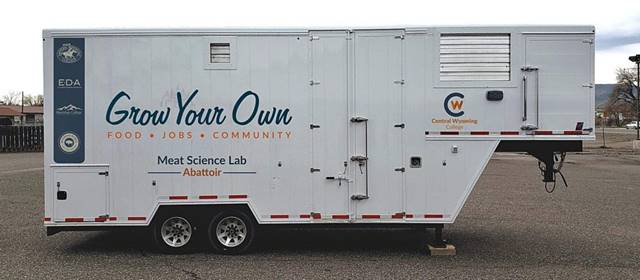Great News! — Central Wyoming College offers new curriculum in butchering and meat cutting
News | June 10, 2020
sreverses
CWC’s mobile meat processing unit will allow for courses to begin this fall, even though the ag complex won’t be finished for another year or two. Photo courtesy of CWC
Ryan
Central Wyoming College in Riverton, Wyoming, is introducing a new, old curriculum in the fall. One that has been attempted in the past at other colleges and fallen flat. In this new climate of consumerism, CWC has high hopes that its meat processing curriculum will have a great demand and fill a gaping need in the industry.
For several years, CWC has been fundraising for an ag complex, focusing primarily on equine needs, however, in recent years, the facility plan has grown to encompass other sectors of agriculture education, including a meat processing facility. The plan is to break ground on the facility this fall, but the meat processing course will be able to begin this fall as well due to a mobile processing unit, said Jack Schmidt, CWC’s local food and agriculture liaison.
“What we’ve found, what’s come to the forefront, is that there aren’t enough butchers for this new system that is developing,” Schmidt said, in reference to the farm-to-table movement. “Where we’re getting a lot more small plants around, it’s going to take a lot more talented, craft butchers.”
Several years ago, CWC President Dr. Brad Tyndall, Schmidt, and several others from CWC sat down with area ranchers to discuss how the college could support their efforts and bolster the industry. Time and again, processing and marketing surfaced as a great need.
“Brad is a visionary; he sees the big picture. He’s not a ranch man; he’s not a cowboy, but he came here and saw all these cattle and all this hay leaving the country,” Schmidt said. “We all saw it, but we didn’t know what to do. We’re shipping resources out, and what he saw then was we’re also shipping our students out. We’re training our local kids to go get a job somewhere else, because there are no jobs here.”
True to CWC’s two-year format, the meat processing curriculum will be offered as a two-year course, with the option to then transfer credits to a university to pursue a meat science degree. Students may also opt to leave CWC with a meat processing certificate in hand and jump right into the industry.
With the meat processing mobile unit, students can go to wherever an animal is and process it on the spot, but Schmidt is adamant that their mobile unit and course will not impede with any of the four local meat processing facilities.
“We want to supply the labor for a private industry; we don’t want to compete with them,” he said.
The program will accept donations, butcher the occasional animal from local ranchers and producers, and establish their own herd to have a continual supply of learning opportunities. The plan is for donations to be served in CWC’s cafeteria, continuing the cycle of locally-raised product.
Wyoming Catholic College, just up the road in Lander, Wyoming, follows this model with primarily sheep sourcing their lunchroom, however, in the past, the school has sent their animals to be processed in Colorado. There is potential, Schmidt said, for collaboration in such an instance.
CWC’s rodeo team’s roping steers may also be a potential source for processing animals, as well as a small herd raised and cared for by students at the college.
“With the ag complex, the production side of it will be a huge part,” Schmidt said. “We can get the grazing school going and production school going, so we’ll have that toolbox to where somebody can learn all the way through, how these cattle are raised, how they’re fed, how they’re processed, and there will be an entrepreneurial section on how they’re marketed.”
Schmidt’s hope with this program is that more local butchering facilities will be established throughout the region, revitalizing small towns and creating more jobs.
“Instead of a 30,000-head per day facility, implement 1,000 30-head per day facilities through the Rockies,” he said. “In each small town, a local guy or gal does 30 head and employs 10 people. He buys all his cattle, hogs, and sheep locally. Imagine the implications it makes on those little towns.”
Greater value is placed on food during this pandemic, Schmidt said, and he feels that people will begin spending more than the eight percent of their budget on food they were prior to effects of COVID-19.
“Food is going up exponentially. That’s going to make it a viable enterprise for a small producer to get into that market and capture some of that money,” he said. “This movement starts with education, and that’s our part.”
Revitalizing an industry that has gone the way of massive processing facilities is no small feat, but it can’t be done without an attempt such as the one CWC is making.
“Timing is everything. I commend Brad for having the nerve to jump out and try it,” Schmidt said. “The timing looks like it’s certainly right, and we’re already getting a lot of inquiry from a lot of people who are wanting to go through the course.”
Max James, a 21-year-old from Idaho is one such inquiry. He developed an interest in meat processing after taking a hunter safety course at 16. Since no other meat-processing courses have been found, James has been learning through YouTube.
“He was very excited to hear CWC was developing a program, and that it would be a way to learn through hands-on experience,” said his mom Holly James. “He loves the fact he could also have a career in multiple ways.”
These options refer to being a traveling butcher or opening a shop in his home town or elsewhere.
